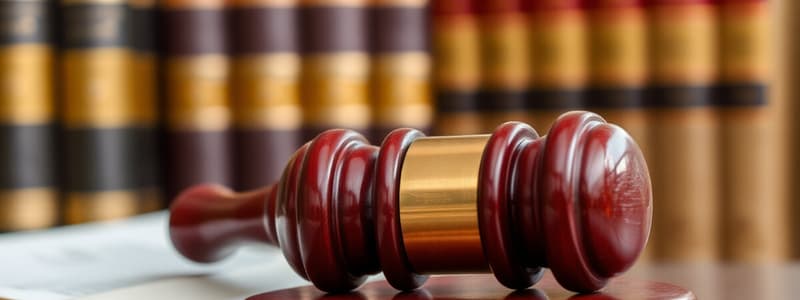Podcast
Questions and Answers
What is the primary purpose of criminal law?
What is the primary purpose of criminal law?
- To promote individual freedoms without restrictions
- To facilitate business transactions
- To provide guidelines for civil lawsuits
- To protect citizens and maintain public order. (correct)
A crime is considered a private matter that does not affect the public.
A crime is considered a private matter that does not affect the public.
False (B)
What is required for something to be considered a crime according to the definition provided?
What is required for something to be considered a crime according to the definition provided?
a prohibited act, a statute prohibiting the act, and penal consequences for breach
Criminal proceedings often involve conviction and sentencing as declared by the ______.
Criminal proceedings often involve conviction and sentencing as declared by the ______.
Which of the following is NOT a stated purpose of criminal law?
Which of the following is NOT a stated purpose of criminal law?
Which type of law deals with offenses against the state?
Which type of law deals with offenses against the state?
Civil law deals with offenses against the state.
Civil law deals with offenses against the state.
Crimes that are inherently wrong are known as Mala in _____.
Crimes that are inherently wrong are known as Mala in _____.
What is the term for crimes that are not inherently wrong but are prohibited by law?
What is the term for crimes that are not inherently wrong but are prohibited by law?
Which of the following offenses is typically punishable by death?
Which of the following offenses is typically punishable by death?
Flashcards
What is a crime?
What is a crime?
A legal wrong followed by criminal proceedings resulting in punishments declared by the state.
Elements of a Crime
Elements of a Crime
A prohibited act defined in a statute with penal consequences for its breach.
Key Aspects of Crime
Key Aspects of Crime
An act (commission or omission) injurious to the public, defined by a statute in force.
Purposes of Criminal Law (Part 1)
Purposes of Criminal Law (Part 1)
Signup and view all the flashcards
Purposes of Criminal Law (Part 2)
Purposes of Criminal Law (Part 2)
Signup and view all the flashcards
Civil Law
Civil Law
Signup and view all the flashcards
Criminal Law
Criminal Law
Signup and view all the flashcards
Mala in se
Mala in se
Signup and view all the flashcards
Mala Prohibita
Mala Prohibita
Signup and view all the flashcards
Offenses Punishable by Death
Offenses Punishable by Death
Signup and view all the flashcards
Study Notes
Classification of offences based on mode of trial
- By summary involve only judges
- By indictment involve jury
- Road traffic offences are criminal but the sanction is a fine
Sources of Ghana Criminal Law
- The laws that give validity to criminal laws
- Written materials
- Judicial precedents
- Sources are agencies by which rules of conduct acquire the character of law by becoming objectively defined
Article 11
- Ghana's laws comprise:
- The Constitution
- Enactments made by the Parliament
- Orders/rules by persons conferred with authority by constitution
- executive instruments
- legislative instruments
- constitutional instruments
- EC makes laws
- Existing law
- Common law, derived from the British
Constitution Offences
-
High Treason
-
High Crime
-
Treason
-
Civil law deals with wrongs against individuals
-
Criminal laws are offences against the state
-
One can petition, writ or motion to make an application to the court
Classification of Offences
- Crimes that are inherently wrong
- mala in se
- Crimes that everyone knows, without being told, are wrong, the sanity of the individual is assessed
- Mala prohibita
- Crimes that in itself are not offences but the law has stated as criminal by jurisdiction
- Example: driving at the wrong side of the road
Offences Based on Hierarchy
-
Offences punishable by death: e.g. Treason
-
First-degree felony e.g. murder, rape
-
Second-degree felony e.g. stealing, unlawful harm to a person, threat of death, misdemeanors
-
Misdemeanors e.g. public nuisance
- Punishment doesn't usually go beyond 2 years
-
A crime is a legal wrong that's followed by criminal proceedings which results in punishments
-
Something is criminal if when carried on to completion will result in conviction and sentencings as declared by the state
-
There must be:
- A prohibited act
- Prohibited by a statue
- Provision of penal consequences for breach
What a crime means:
- Is an acts of commission or omission that is injurious to the public
- The prohibition must be made under a statute in force; also with definition of the crimes
- Criminal law falls under public law
Purpose of Criminal Law
- To protect citizens
- To regulate the activities of individuals
- To protect our properties
- To protect the weak from the strong
- Maintenance of public order and morality
- Protection of the economy
- To comply with international obligations
Studying That Suits You
Use AI to generate personalized quizzes and flashcards to suit your learning preferences.




